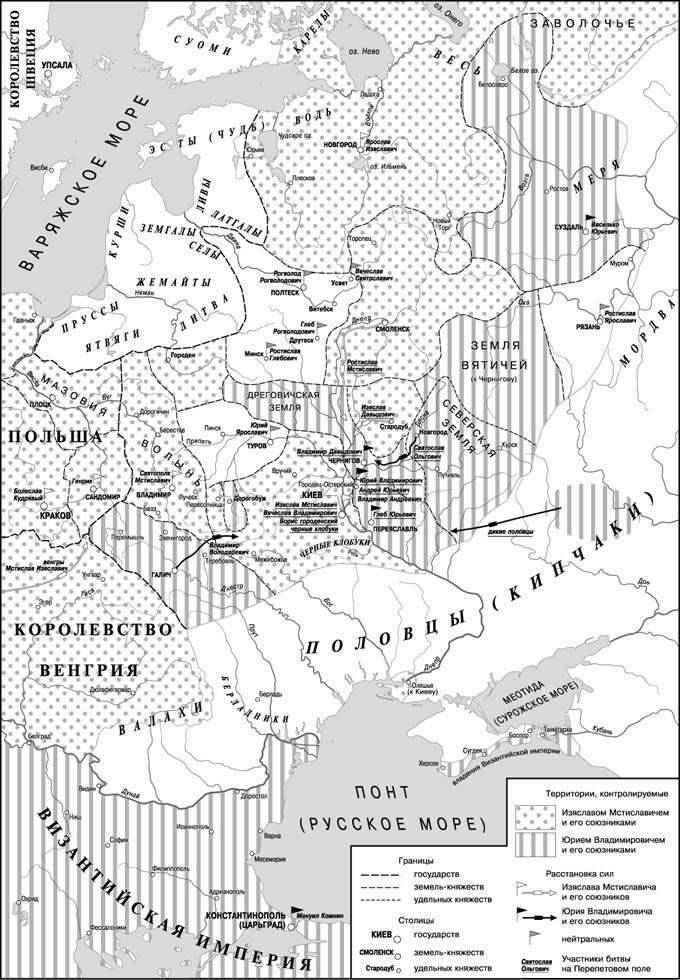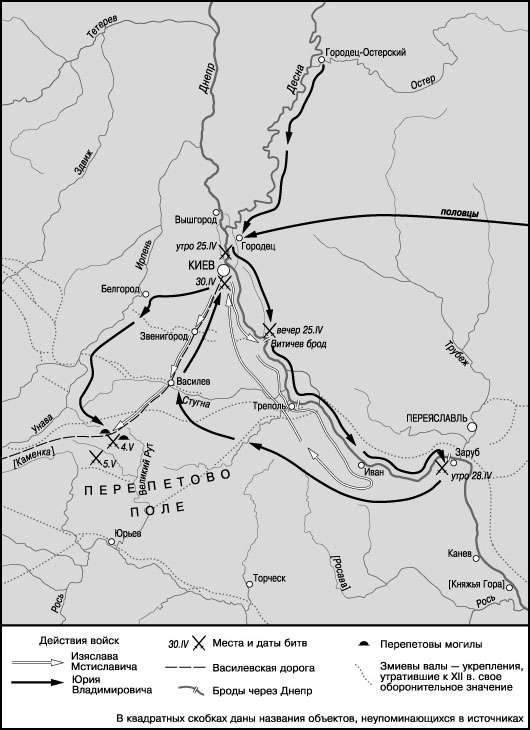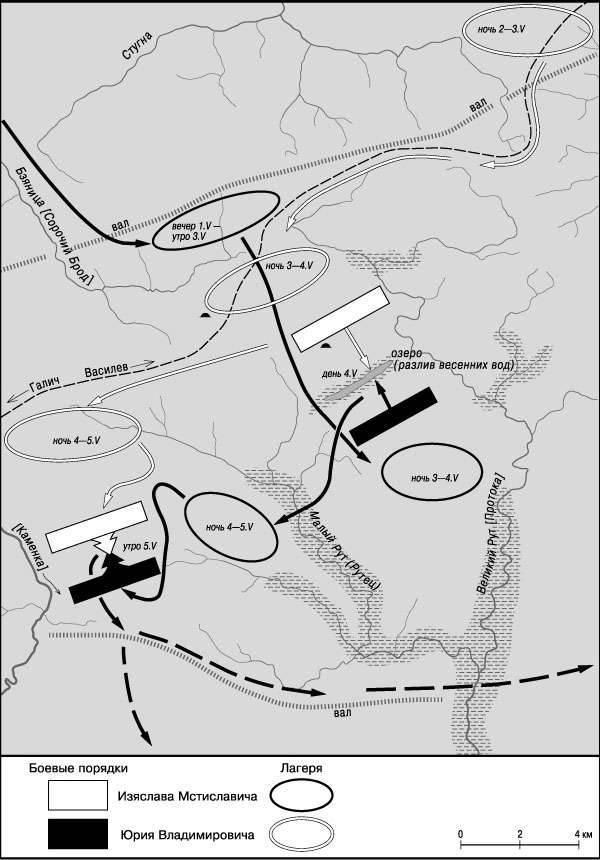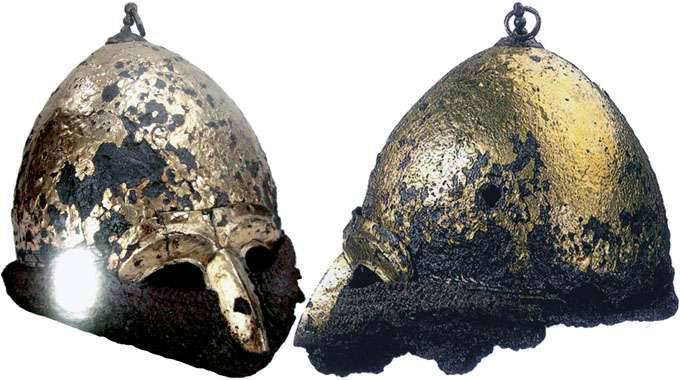Battle of Repeated Field (5 May 1151)
In 1146, Izyaslav, who reigned then in Pereyaslavl, smashed Igor Olgovich unpopular among Kiev residents under the walls of the capital city and for the first time became a Kiev prince, and Igor was in his captivity. His brother, Svyatoslav Olgovich of Chernigov, stood up for Igor, but was defeated and, having lost Chernigov, turned to Yuri, the prince in Suzdal, for help.
Involved in the conflict, Yuri soon became the main competitor of Izyaslav. In September, 1149 Izyaslav suffered a defeat at Pereyaslavl and gave Kiev to Yuri, but in August 1150 became Kiev Prince again, but only for a week. But in March — April, 1151, the city of Izyaslav, made a swift march from Vladimir (Volynsky) and, catching Yuri by surprise, forced him to flee from Kiev a second time. Having occupied the capital, Izyaslav made the right move, yielding the “table” to his uncle Vyacheslav Vladimirovich, the oldest in terms of age and descent count among the Monomakhs. Aged and soft-tempered Vyacheslav suggested that the energetic Izyaslav rule together. Thus, Yury’s legal trump, the “eldership” in relation to Izyaslav, was knocked out of Yury’s hands.
Easily settling political issues, Izyaslav had to return to military matters, since Yuri was not going to concede. He settled in Gorodtsa-Ostersky (now the city of Oster) - a powerful base in 90 km from Kiev - and began to prepare for revenge. His allies and vassals gathered here: sons Andrei and Gleb, nephew Vladimir Andreevich, Vladimir Davydovich Chernigov and Svyatoslav Olgovich Novgorod-Seversky with his nephew Svyatoslav Vsevolodovich. Yuri's troops marched to Kiev by river (along the Desna) and by dry road, and on April 24 approached Gorodets, a guard fortress on the left bank of the Dnieper, from where a panorama of the capital city opened. Here Yury was joined by the “wild” Polovtsy (they were called “wild” not by virtue of their low cultural level, but because this nomadic union was formed by the Polovtsy who were not part of the “traditional” hordes).

Apart from the detachments of Izyaslav Mstislavich and Vyacheslav Vladimirovich, the forces of Rostislav Mstislavich of Smolensk, Izyaslav Davydovich of Starodubsky, Boris Gorodensky, the Kiev militia and the black klobuk (the Turkic tribes who formed the “shield of Russia” from Husbands) were in the ranks; Torquay, Berendey, Pechenegs and Kovui are mentioned). Very rough estimates allow us to estimate the forces of the Volyn-Smolensk coalition in 15 thousands, including about 4 thousands of Kiev militias (in the chronicle it is mentioned that they were both horsemen and pedestrians, and that the veche decided to send everyone who “can I would take the club in my hands ") and at least 5 thousands of black hoods. The forces of the other side can be estimated in 6 thousands of warriors and 3-4 thousands of Polovtsians.
Perhaps Yuri was counting on approaching Kiev earlier than his loyal vassals, the black hoods, joined Izyaslav. In this case, given the low combat effectiveness of the Kiev militia, Yuri would have a significant advantage. There was another reason to hurry: the army was sent to the aid of Izyaslav, sent by his son-in-law - the Hungarian king Geisa II. True, Yuri was expecting reinforcements in the person of his matchmaker, the Galician prince Vladimir Volodarevich. But Galicians, it seems, was no more than Hungarians (if you believe the chronicles, the latter were over 10 thousands of "valiant men").

All adult princes-Rurikovichi, which operated in April 1151 (on a white background within the framework), and their ancestors are shown.
Yuri faced a difficult task - to overcome the Dnieper in view of the enemy army. Already at the mouth of the Desna battle took place between flotilla Yuri, and the ships of Izyaslav, better adapted to river battle. Yuri was forced to seek a crossing far from Kiev. After his attack through Witchevsky ford was repelled, Yuri decided to try his luck on Zarubsky ford. Here, the Chernihiv-Suzdal troops were opposed only by a small detachment of the governor of Shvarn. "And then the Polovtsi ... wade against them on horses, with shields, and with spears, and in armor to fight. And they covered the Dnieper with many soldiers, and Russia moved in the boats. Schwarn, having seen this, ran and ran to Izyaslav. After all, he [Izyaslav], at that time sent his son Mstislav to Ugra [ie, Hungary], and therefore the ford was unreliable, since the prince was not here, and not everyone was listening to the boyar. "

Izyaslav hurried to the defense of Kiev. He placed all his forces around the city. Soon here came the shelves of the enemy. The clashes, in which the forward detachments of Yuri were repelled with significant losses (among the dead were the son of the famous Khan Bonyak), forced him to retreat and head towards the union with Vladimir Galitsky. Izyaslav moved next, trying to prevent it. Yuri went to Belgorod - the fortress that controlled the bridge over Irpin and served as the western "gate" of Kiev. Obviously, Yuri intended to hide behind the powerful and extensive Belgorod fortifications and wait for his ally here. But Belgorod residents did not open the gates to the Suzdal prince, saying: “How did Kiev open for you? And our princes are Vyacheslav, and Izyaslav, and Rostislav.” Then Yuri turned south to reach the Vasilevskaya road, going from Kiev to Galich, bypassing the headwaters of Irpin. In the evening of May 1, Yuri camped on the northern edge of the Perepetov field, at the Perepetovyh graves - two Scythian burial mounds, which kept this name to our time. Yuri was hoping for the quick arrival of Vladimir Galitsky, but already on the night of May 3 his “watchmen” were attacked by the forward detachments of Izyaslav. On the morning of May 3, the main forces of the Volyn-Smolensk coalition entered the Perepetovo field. The day passed in fruitless negotiations. Opponents had to figure out the relationship in the general battle, which was seen as the judgment of God. Let's give the word to the chronicler.
"On Thursday’s day, before [the sun rises], both Vyacheslav, and Izyaslav, and Rostislav marched on an open field and moved to fight [there] where Yuri stood. For they sent messengers among themselves about the world, but Olhovichi and Polovtsy didn’t they gave up to be reconciled because they were quick for bloodshed, and they stood until the evening. Yuri [also], having passed for Ruth, became.
When Friday [4 May] was getting light, Izyaslav, having prepared all his regiments for the battle, moved towards him. But Yuri did not want to fight yet, but waited for Vladimir [Volodarevich]. Izyaslav, meanwhile, got closer and closer, and then God made [such] darkness that he was not visible anywhere, only to the end of the spear [it was] visible. And [they] caught rain, and they both rested against it into the lake, and separated their lake, and therefore it was not possible [to go] to those [them] or those.
The mist rose in the afternoon, and the sky cleared. And they saw the troops of each other on both sides of the lake; and therefore they fought on the wings of both troops. and the troops themselves could not move together. And in the evening Yuri went over the hills with his shelves. Vyacheslav, Izyaslav and Rostislav followed them to the upper reaches of the lake, with the intention to fight him. But Yuri went ahead of them with his own shelves for the Maly Rutets and, crossing the mud, there he stood for the night. Vyacheslav, Izyaslav and Rostislav, having passed, stood right in front of him for the night. They stood so one against the other, that the arrows did not reach.
And on the second day, on Saturday [May 5], when the dawn began, first in the army, Yuri was struck in tambourines and sounded the pipes, and the shelves began to be prepared. Also, Vyacheslav, Izyaslav, and Rostislav began to beat tambourines and trumpet pipes, and the shelves began to be prepared. Yuri then with his sons, and Vladimir Davydovich, and Svyatoslav Olgovich, and Svyatoslav Vsevolodovich, having prepared their regiments, moved to the headwaters of Rutz. And Vyacheslav, Izyaslav and Rostislav also went their own regiments against them. When it was close to the headwaters of the Rutz, then Yuri, and Vladimir Davydovich, and Svyatoslav Olgovich, and the Polovtsians were wild, and Svyatoslav Vsevolodovich, turning their regiments, went to the Great [16] Ruth, not wanting to fight, because they were trying to go beyond Ruth , and here wait for Vladimir Galitsky. Vyacheslav, Izyaslav and Rostislav, seeing this - that they were moving away from them - sent their archers, black hoods and Rus, behind them, and then they began to run into the rear of their regiments, shoot with them and began to take away their carts. When Yuri, and his sons, and Vladimir Davydovich, and Svyatoslav Olgovich, and Svyatoslav Vsevolodovich, saw that they could not go beyond Ruth, when they saw that they were hitting their rear regiments and carts were taken away, then, turning their regiments, they became against them.
And when they went to fight, Andrew began to lead the regiment of his father, because he was then the eldest between the brothers. Seeing that the Polovtsians were standing behind them, he rode up to them and strengthened them into battle, and from there entered his regiment and strengthened his squad.
At the same time, Izyaslav and Rostislav rushed to their father, Vyacheslav, saying: "You wanted a lot of good things, but your brother did not want it. But now, father, we will lay down our heads for you, or we will earn your honor." Vyacheslav said: “Brother and son! I didn’t like bloodshed from my birth, but my brother brought me to this. When we are in this place, it’s already God’s judgment.” And then they both bowed to him, and drove to their shelves. And Izyaslav drove into his army, and sent to all his regiments, saying: "Look at my regiment. And as my regiment will go, so do you go." And then the shelves moved one to another.
When more regiments came alone to meet others, Andrei Yuryevich, taking a spear, drove forward, and collided before everyone else, and broke his spear. Then a horse was struck under his nostrils, and the horse began to rush under him, and the helmet fell from him, and the shield on him was cut off. But thanks to God's intercession and the prayers of his parents, he remained intact. And just in front of all the regiments, Izyaslav drove in, alone, broke his enemy troops and spear. And then they slashed him in the arm, and they hit him in the thigh, and from this he flew off his horse.
When the shelves were stepped down, there was a fierce and evil feud. God, and the holy Mother of God, and the power of an honest life-giving cross helped Vyacheslav, and Izyaslav, and Rostislav, and then they defeated Yuri. And the Polovtsy Yuryevs, not even letting in an arrow, then ran, and then the Ol'govichi, and then Yury ran with the children. And when they fled through Ruth, a lot of the squad was drowned in Ruth, for he was swampy. And when they fled, they beat some and captured others. Here they killed Vladimir Davydovich, the prince of Chernigov, kind and gentle, and many others were beaten, and the Polovtsian princes captured many, and others were beaten.

When the troops came together, both horse and foot, Izyaslav lay wounded. And then he raised himself, and here the footmen of Kiev wanted to kill him, taking him for the enemy and not recognizing him. Izyaslav said: "I am a prince!" And one of them said: "Oh, so we need you!" And taking out the sword, he began to chop the helmet. The holy martyr Panteleimon was written in gold on the helmet above the brow. And he struck him with a sword, and so he made his way to his forehead. Izyaslav said: "I am Izyaslav, your prince." And he took off his helmet, and they recognized him. And when they saw this, many took it with their own hands, with joy, as the king and his prince. And then all the troops exclaimed: "Kyrie eleison!" ["Lord have mercy!" - Greek], - rejoicing that they won the regiments of the opponents, and seeing their prince alive. "
The chronicle passage is rich in curious enough details: we will find out what tools we used to give signals; We see the use of light cavalry to pin down the enemy, realistically described (for example, it is worth noting that according to archaeological data, injuries to the thigh and arm were most typical for European knights) were adventures that were not energetic (he was 55 years) Izyaslav Mstislavich and the young, the reckless Andrei Yurevich (before that, he almost died during the siege of Lutsk and when crossing the Lybid in the battle near Kiev), and even read an old Russian anecdote about how inexperienced Kievans nearly killed their beloved prince by mistake ( probably his helmet had a mask - a metal mask). However, the death of the prince was a rare phenomenon - the armor was fairly reliably protected from the vicissitudes of the battle, and from the words "hit a horse under his nostrils" it can be assumed that the prince's horse was protected by an iron headband. The words "and the shield on it was cut off" are also not interesting - it seems that the shield had a neck strap.

But the chronicler does not tell us the tactical details of the battle, as usual, the battle was a frontal ram collision between two masses of heavily armed cavalrymen. At the same time, infantry, which is generally characteristic of the Middle Ages, played a supporting role — it often did not enter the field battle, but only followed the mounted regiments, finishing off or taking prisoner hostile fighters. Izyaslav outplayed Yuri strategically - skillfully breaking away from Vladimir Galitsky’s troops, Izyaslav seized Kiev without a fight, securing the help of Kiev warriors, militia and black hoods, and then collecting superior forces, imposed on the enemy a decisive battle on the field bounded almost from all sides by rivers and "serpent shafts," which led Yuri to a catastrophic defeat. Fighting continued after that, but they no longer had any special significance - the outcome of the war for Kiev was decided by a brief but fierce battle on the banks of the rivers Ruth and Rutz, in the vicinity of the modern village of Grebenka in the Kiev region.
Information